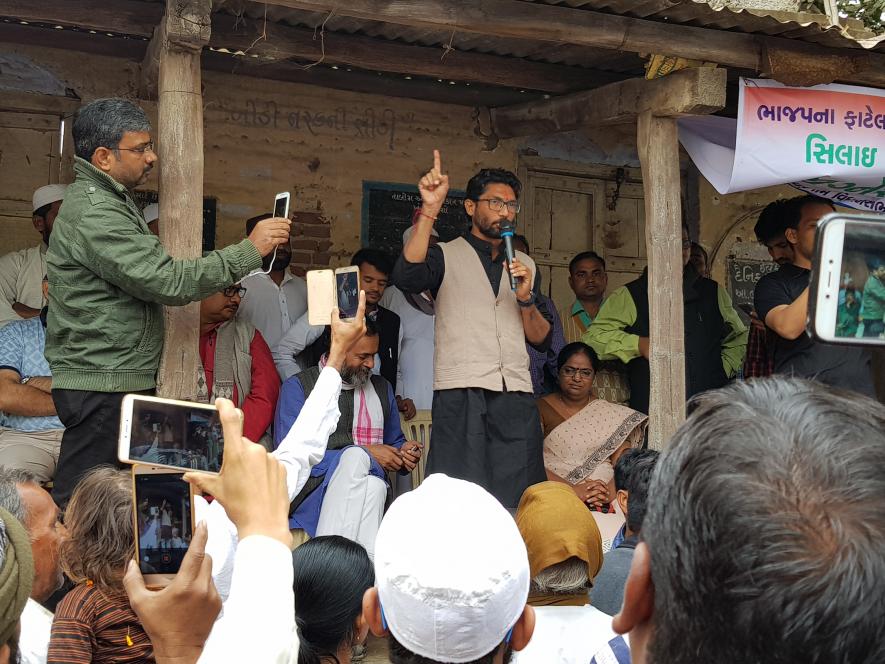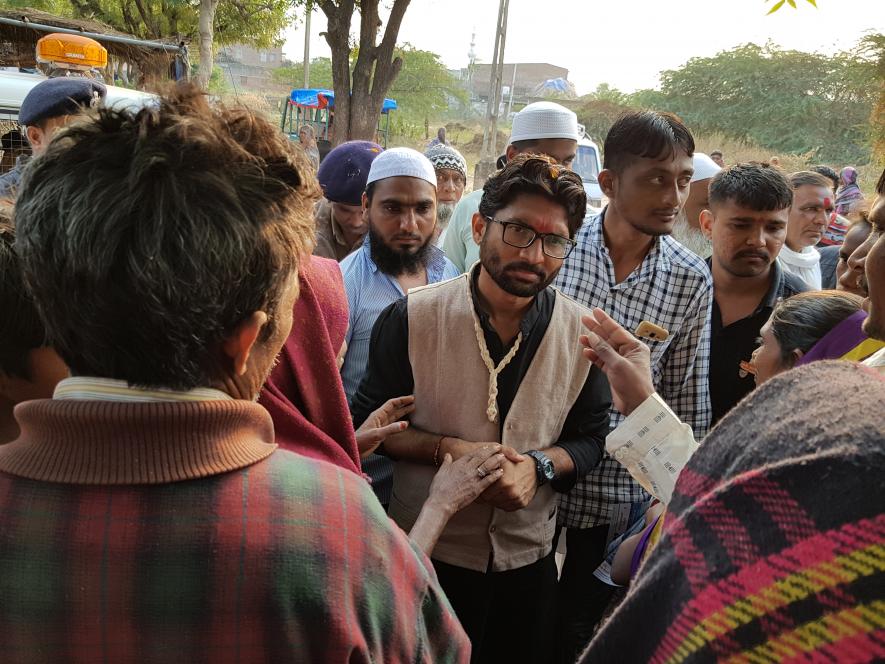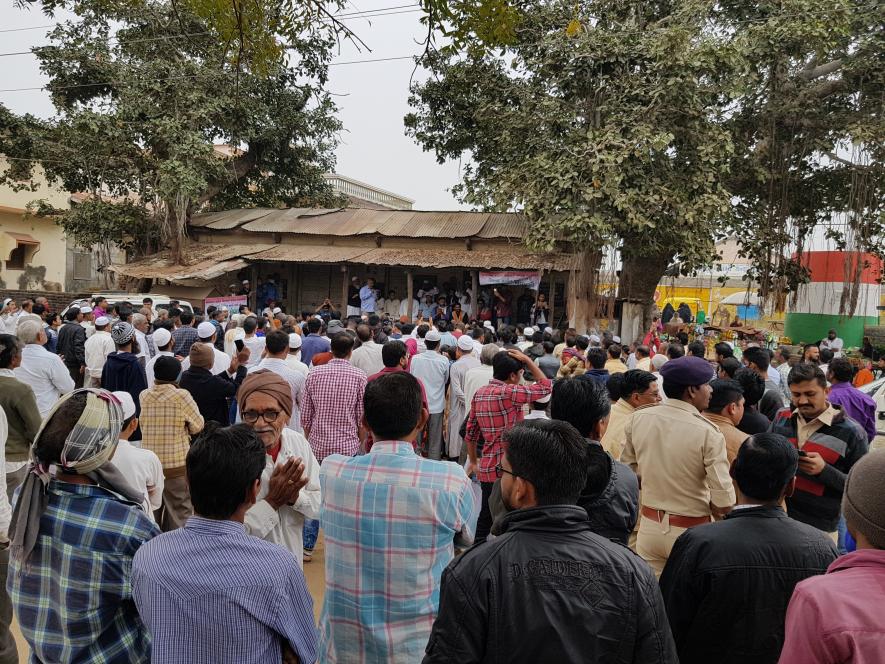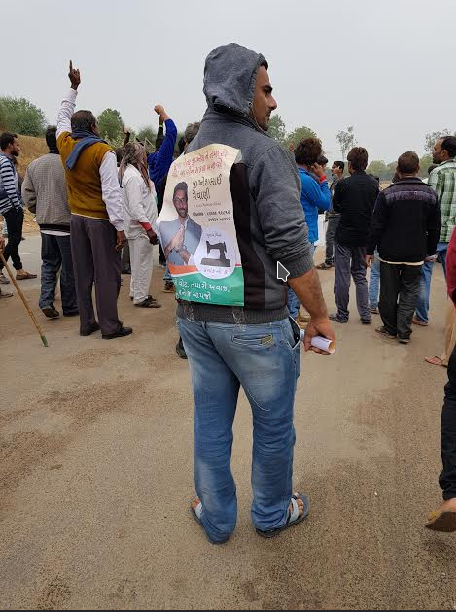Dalit and Muslim are Coming Together in Gujarat

Some 150 Km from Ahmedabad, hundreds of villagers were waiting for hours to listen to Jignesh Mevani’s power packed speech. They have seen him on TV several times, but now he is standing among them.
With sore throat he screamed ‘Rupani Sahab Singhasan khali karo, Janta aa rahi hai’.
They responded with claps and whistles.
Shambu Lal, an aged man carrying his grandson in his lap, thinks that he is quite young for politics.
Vimlaben in her sixties sees him as a Dalit messiah.
Sunita, a first time voter, will vote for him and hopes that he would not forget the women, the poor, and the farmer after winning the election.
Faizan, in his 20’s, is sure that he’ll solve the unemployment issue of the village.
Famous psephologist, Yogendra Yadav, believes that he represents energy, youth, and struggle. According to him, he also represents the second generation of Dalit movement in India.

The four Dalits were tortured in July 2016 for allegedly skinning a dead cow. He stood against the torture and headed a Dalit Asmita Yatra (a march for self-respect) from Ahmedabad to Una. First time he was regarded high because this movement brought Dalits on a single stage for asking justice for the victims, which they were given.
Jignesh Mevani is a lawyer and activist. This 37-year-old young man has been the prime figure of the Ambedkarite movement in Gujarat where Dalits make 7% of the State’s population
Mevani symbolized an emerging force against the BJP, a ruling party for 22 years. He has been appraised as Dalit leader like Patidar leader Hardik Patel and OBC leader Alpesh Thakore. Last month he made announcement for contesting election as an independent candidate from the Vadgam constituency of north Gujarat's Sabarkatha district. Congress has allied with Mevani’s Rashtriya Dalit Adhikar Manch and sat back.
“Upper class people see us with derogation, we face discriminations everywhere, we are not allowed to enter in their homes, temples because of our caste” said Chavan Pravin Bhai Mula Bhai with an angry tone. He runs a steel shop on Chhapi highway, some 11 Kilometers from Vadgam and has come to attend Mevani’s rally. “We just want to be treated like human beings”, he added.
Untouchability is served everywhere Dalits go. A report (Navsarjan Trust, 2007 & 2009) reveals the fact that the non-Dalits keep separate utensils at home to serve them food or tea. These cups are called 'Ram patra'. This survey was conducted in 1489 villages across 14 districts. Gujarat Govt. refuted the report, and said untouchability doesn’t exist. Ignoring the problems of Dalits only helped the rise of atrocities against them in the state.
30-year-old Parmar Suresh, a Dalit from Rajosana village, is M.Ed, and working in a tractor-making company. He sees discrimination against Dalits to be ingrained deep inside in upper caste society.
“ We can’t keep moustache, we can’t have good clothes, the upper class people are jealous of us”
“ Gujarat Model is only for businessman, not for the oppressed communities, we have no freedom, there is no democracy here.” He added.
Though Gujarat is considered a Model State but discrimination against Dalits is very high.
In an interview with me Mevani argues that Gujarat Model is not only not inclusive, it’s devastating for common masses.
“Gujarat model for Dalits is a casteist, communal, fascist, capitalist, devastating model of development, with a goebbelsian rhetoric of development.” He said.
“And Modi is the Natsamrat of the nation, he is primarily fascist” He added.

Mevani has understood that Gujarat can never progress until different sections of society come together. He knows exposing inequalities do not win elections. One needs to utilize public opinions to pinpoint government’s failures. He worked hard to form a coalition of OBCs, Dalits, and Muslims etc. It’s Mevani’s vision that can give the Congress Party cause of hope in Gujarat.
Yogendra Yadav thinks that the first generation of Dalit leader had been involved in the humdrum of the nitty-gritty of power politics but the second generation of Dalit leaders, like Jignesh Mevani, he sees the possibility of a much broader vision.
“What distinguished leaders like Jignesh Mevani is their capacity to build bridge with other similarly placed communities. So there is a beginning of ‘coalition of oppressed’, which was not in the vision of people like Kanshi Ram and Mayawati.” Said Yadav.
In a Muslim dominated Pirojpura village Mevani talks about the importance of Dalit- Muslim unity.
“Sathiyon in last 22 years in Gujarati people were divided between Hindu and Muslim. They are using scissors but we brought them sewing machine. We have good intention and we’ll work together to stitch the fabric of unity.”
Sewing machine is his election symbol, which he refers as a bridge among different societies.
Mohammad Rafique Momin, an aged man, listening to Mevani from a distance of the crowd.
According to him, Mevani is a revolutionist who sacrifices his life for the common people, and he is not impressed with the way Modi deals with farmer and communal issues.
“Modi did nothing for farmers. If we buy pulses, vegetables from market it’s expensive, and if we grow the same and sell it in the market, we don’t get its right price”
When asked about the condition of Muslims in Gujarat he gave a grieving smile
“ You are from media, you know better than me”. He said.
Rehan, a young farmer in his mid-twenties, is angry at Gujarat Govt.’s response towards farmers’ issues.
“The farmers are not getting proper rates for their crops; there are no schemes from the Govt. The backbone of the farmers are broken”.
“This govt. should go, because they are communalizing our society”. He added.

According to Professor Ghanshyam Shah, Muslims doesn’t exist in Narendra Modi’s Government. But in this election, neither Congress is raising Muslims issues nor BJP showed any interest to talk about them.
“After Sachchar committee’s report, UPA planned to give scholarships to minority students, so the committee came to Gujarat. Modi refused to meet them and said there is no minority or majority in Gujarat”, said Prof. Shah.
“Minority is invisible in Gujarat, there is only majority.” He added.
Union of Dalits and Muslims is a new beginning, both communities are socio economically marginalized in the State. Muslims have been forced to live a lost life and become victims of communal violence in time.
When gau-rakshaks attacked and preyed on the Dalits, they compared themselves no more better in plight than Muslims. Both communities faced huge loss in leather industry, which again made them feel their shared plight.
The triad of Hardik, Aplesh and Mevani had succeeded in channelizing the discontents of a large section of voters. And their movement brought caste in forefront, which is directly confronting BJP’s Hindutva agenda. A shift in paradigm.
It’s wrong to see the three young men’s fight merely between opposing political parties and their ideologies. The fight is to end an era made of polarization and exclusion through alliance based on identity. Unfortunately, politics in Gujarat seems to rest on the evils of casteism and communalism.
Aaquib Khan (@kaqibb) is a Mumbai based independent media professional.
Disclaimer: The views expressed here are the author's personal views, and do not necessarily represent the views of Newsclick.
Get the latest reports & analysis with people's perspective on Protests, movements & deep analytical videos, discussions of the current affairs in your Telegram app. Subscribe to NewsClick's Telegram channel & get Real-Time updates on stories, as they get published on our website.
























